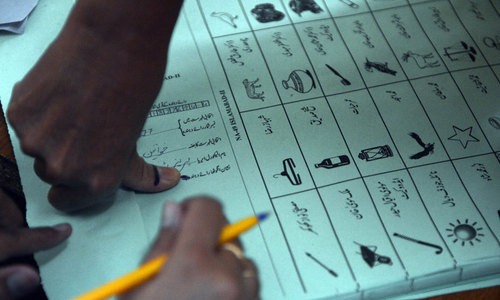ISLAMABAD: Though the Election Commission of Pakistan (ECP) says that rules were followed during delimitation of constituencies, a report released on Friday claims that the principle of equality of vote has been compromised in one-third (81) constituencies of the National Assembly as the variation in population size of the constituencies exceeds the ordinarily permissible legal limit of 10 per cent.
The report prepared by the Free and Fair Election Network (Fafen), a network of over 50 civil society organisations, claims that of the 81 constituencies, 59 have a variation rate between 11pc and 20pc, 11 between 21pc and 30pc, six a higher rate between 31pc and 40pc and five constituencies an exorbitantly high rate between 41pc and 50pc.
The report says the Election Rules, 2017 appeared to have been strictly adhered to but in that process legal principle of equality of vote has been compromised. The law provides for equality among constituencies but the rules have attempted to follow this principle among the provinces and districts.
“Legally, as far as possible, variation in population of constituencies of an assembly should not ordinarily exceed 10pc. However, the Fafen analysis reveals that variation exceeds the limit of 10pc in as many as 81 out of 260 National Assembly constituencies which are being delimited in the light of the Elections Act, 2017. The Act allows ECP to deviate from this permissible limit in only exceptional cases... The ECP has used this discretionary power in case of around one-third of the constituencies being delimited which goes against the spirit of the equality of vote as stipulated in the Elections Act, 2017,” it says.
The report claims that each of the three constituencies of Islamabad has a population 14pc less than the national average of population as per NA constituency. Similarly, the population in Balochistan’s NA constituencies is also lower than the national average while the population size of constituencies in the remaining three provinces is above the national average.
Fafen asks ECP to ensure that people’s right to equal representation is respected all across the country
According to the report, the variation in population size becomes more obvious within the provinces. For instance, in Khyber Pakhtunkhwa NA-37 Tank represents 391,885 citizens while NA-35 Bannu has a population of around 1.2 million. Similarly, in Punjab, NA-37 Jhelum-II has been demarcated as a seat with a population of 546,113 souls while NA-87 Hafizabad-I has a population of almost 1.2 million -- almost double the Jhelum constituency.
In Sindh, NA-199 Shikarpur-II has been created with a population of 588,185 citizens while NA-197 Kashmore has a population of 1,089,169 individuals. In Balochistan, NA-262 Kachhi-cum-Jhal Magsi has a population of only 386,255 people against NA-268 Mastung-cum-Chagai-cum-Kalat-cum-Shaheed Sikandarabad-cum-Nushki that has almost thrice of this population i.e. 1,083,497 individuals.
At the national level, Balochistan’s constituency NA-262 is the smallest with regards to the population size while the KP constituency NA-65 is the largest.
Published in Dawn, March 17th, 2018














































